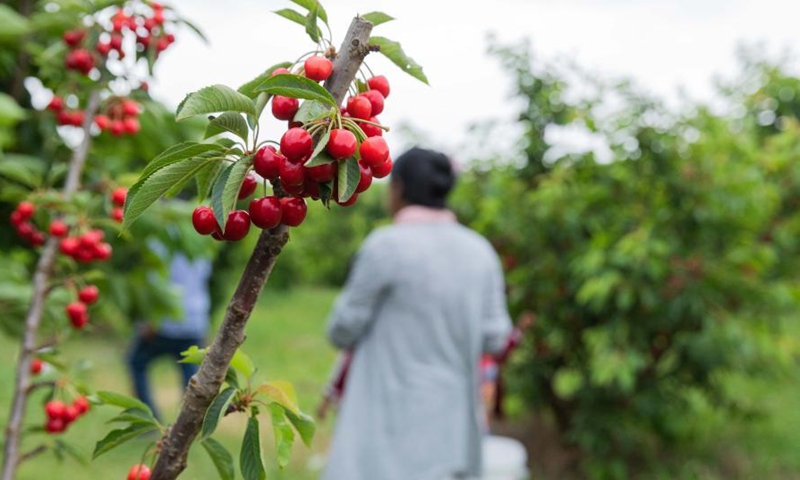China-Australia Free Trade Agreement review in limbo as ties sink to decades-low
By GT staff reporters Source: Global Times Published: 2020/12/6 20:23:40

Photo taken on Dec. 5, 2020 shows a cherry orchard in the town of Young in Australia. The town of Young is dubbed the "Cherry Capital of Australia". Its cherry picking season came recently and attracted visitors to taste and buy fresh cherries and related products. (Photo by Chu Chen/Xinhua)
The sphere and scope of the China-Australia Free Trade Agreement (ChAfta) may not be deepened and widened at the fifth anniversary review meeting between China and Australia, as bilateral ties have deteriorated to their lowest point in decades amid Prime Minister Scott Morrison administration's political campaign against Beijing, Chinese analysts said on Sunday, as time nears for a scheduled review.
No substantial talks will take place, and no talks may even occur at all, about the ChAfta that was due to be reviewed five years after the signing in December 2015, against the backdrop of bilateral relations being at their lowest ebb since the establishment of diplomatic relations in 1970s, experts said.
Chinese analysts said that the ChAfta, signed to show China's goodwill to expand bilateral trade and improve the livelihood of people on both sides, will not only fail to be upgraded but will actually be weakened due to the relentless hostile approach from the Australian side, starting from calling for a weapons-inspector-style probe into the COVID-19's origin to China's internal issues over Hong Kong, and the recent demand for an apology from China over an illustration depicting its own soldiers' bloody killings in Afghanistan.
"High-level exchanges between the two sides, as well as relatively intermediate level exchanges at the economic, trade and diplomatic levels, have been frozen," Ning Tuanhui, a research assistant with the China Institute of International Studies, told the Global Times on Sunday.
"Against this background, it will be difficult to initiate the review of the ChAfta," Ning said.
Analysts said that Australia has an inescapable responsibility for the deterioration in relations, which have worsened to the lowest point since the establishment of diplomatic ties, as Australia has closely followed the US in its unfriendly crackdown on China, in some cases even taking the initiative to worsen relations with China before the US did.
"In this context, even if there was a mechanism to review it five years later to upgrade the negotiations, (despite the existence of the five-year review), it will be difficult to move forward in the current political climate," said Ning.
Australia now wants to distance itself politically and economically from China for fear that it will become too dependent on China for business, and China will use its economic influence to interfere in Australia's domestic affairs, experts said.
However, Australia wants to keep its exports, including those of minerals, agricultural products and meat, going to China and making money from it to promote consumption and investment at home, analysts said.
ChAfta has reportedly given rise to nearly $240 billion in two-way trade. The two countries pledged to start a three-year review in 2017 that was to include consideration of deepening liberalization and further expansion of market access.
A report by theconversation.com, a media outlet based in Australia, suggested an all-out trade war with China would cost Australia 6 percent of its GDP, in a simulation in which 95 percent Australia-China trade is cut off.
Even if no progress is made at the review, the ChAfta itself won't be discarded, analysts said. But they said that the deal has been made less effective by Australia.
He Weiwen, a former senior trade official and an executive council member of the China Society for World Trade Organization Studies, said Australia caused the current version of the pact to shrink in its effects, with its alleged dumping and subsidies to certain products, and poor quality issues with others.
"China's probes and measures are in compliance with WTO rules and in no way constitute a threat to the existing FTA," He told the Global Times.
Ditching the ChAfta is unlikely given China's open attitude toward free trade. China announced in November that it will favorably consider joining the Comprehensive and Progressive Agreement for Trans-Pacific Partnership, and it joined the Regional Comprehensive Economic Partnership (RCEP)
Song Wei, an associate research fellow at the Chinese Academy of International Trade and Economic Cooperation, said that the ChAfta is one of the highest-standard FTAs China has signed with its trading partners, but Australia's move to take sides amid the China-US trade war has put a benign cooperative relationship, built over the years, into a stalemate.
"Whether the China-Australia trade and economic relationship can go smoothly depends on whether Australia can readjust its position and policy to the normal track of objectivity and reason," Song told the Global Times.
The RCEP could in some way help Australia offset some of the negative impact from its frayed relationship with China, at a critical time when it's recovering from the COVID-19 impact, but the mega trade pact is still in its infancy, and in some aspects it is not as good as the ChAfta, said Song.
Posted in: ECONOMY